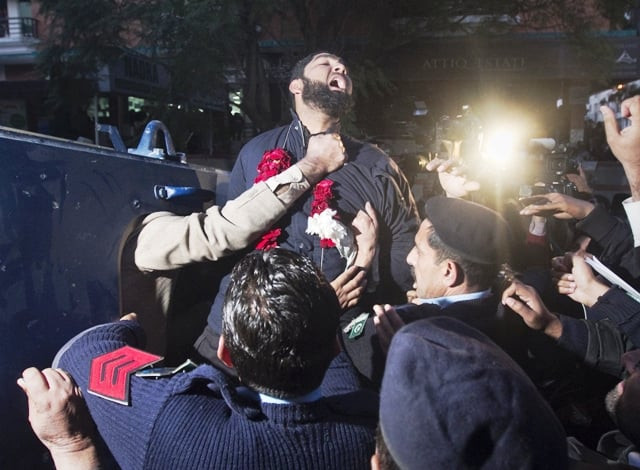The monster rising within us
Member of Punjab elite force, Mumtaz Qadri, kills Governor Salmaan Taseer during his visit to Islamabad.

The monster rising within us
Controversy over the blasphemy law has been tragically divided on the basis of Urdu-English readership vis-a-vis the print media. The Urdu press has maintained a conservative point of view close to the clerical consensus developed through an aggressive campaign by the Deobandi-Ahle Hadith-Barelvi schools of thought. Mumtaz Qadri could have only read the more emotive stance taken by the Urdu press and TV channels where fatwa-like statements of religious leaders were being publicised. The prayer leader of the mosque he frequented probably did the rest of his brainwashing.
After the murder, over 500 clerics of the Barelvi school have praised Mumtaz Qadri for killing Governor Taseer, urging Muslims across the country to boycott the funeral ceremony. (It is likely that the khateeb of Badshahi masjid declined a request by the administration to lead the funeral prayers.) The message was: “No Muslim should attend the funeral or even try to pray for Salmaan Taseer or express any kind of regret or sympathy over the incident.” The fatwas regularly printed in the Urdu press had apostatised him for opposing the blasphemy law, completely ignoring the fact that objections raised by most experts were related only to the enforcement of the law.
Some thought the unprecedented clerical campaign was a mullah-military orchestration, but the truth is that instead of becoming a counterforce to the Deobandis and Ahle Hadith, the Barelvis joined the very elements that had attacked the shrines held sacred by them.
Intimidation works in Pakistan. Maulana Sarfraz Naeemi was killed by a suicide bomber after he opposed suicide bombing. Swat’s university chancellor and Islamic scholar Farooq Khan was killed after he condemned the enforcement of the so-called Islamic punishments in Orakzai Agency. Enlightened Islamic scholar Javed Ahmed Ghamidi was challenged again and again till his school was attacked and he simply removed himself from the discussion of the blasphemy law to which he was opposed.
Who organised the latest campaign against the government, after a PPP MNA brought a proposed amendment bill to parliament? Despite the intellectual consensus that only the procedures needed to be changed to prevent abuse of the law, and the government’s disavowal of any amendments in the law, the virulent campaign continued. A UN-banned jihadi outfit declared in its banned publication that it had organised the campaign by calling together all the leaders of the religious parties. The jihadi organisation is internationally recognised as a state-protected outfit and has been noted as a close collaborator of al Qaeda inside Afghanistan. The TTP’s deputy leader, Maulvi Faqir Muhammad of Bajaur, has already declared his organisation’s backing to the campaign.
The Federal Shariat Court, in its recent verdict, has thrown out procedural changes made in rape cases where women — the victims — are actually victimised under the law, more or less, like victims of the blasphemy law. This has unfolded within the general trend of making Pakistan ready for an al Qaeda takeover whose leader, Ayman al Zawahiri, has written a critique of the Pakistan Constitution, negating the present order in the country and proposing a new one, more in agreement with the madrassa clergy. Some madrassas are even distributing the Zawahiri constitution in Pakistan. Is it intimidation pure and simple, or is it a sign of the nation making ready to welcome a new order under the terror of al Qaeda and the TTP?
Politicians are taking cover. In Punjab, the ruling party is gradually turning away from its more pacific Barelvi hinterland in central Punjab to the more powerful jihad-oriented Deobandi centres of power in the south. No one wants to be killed like Governor Taseer. Who can prevent police employees from following in the footsteps of their masters? The PPP prime minister is leaning on his Syed origins to say he could not allow any changes in blasphemy law because he was a descendant of the Holy Prophet (pbuh).
All our wounds are internal. They are not inflicted by Blackwater, Mossad or RAW but by our own extremism. Senior police officers who come on TV to say that terrorism targeting innocent people is actually perpetrated by a “foreign hand” should take a look at the men they recruit to look after ordinary people. It is quite clear that no reorientation is imparted to men after recruitment into the police department. The cleric is free to inject into them whatever pre-modern ideas of governance and retribution he has grasped with his narrow mind. Extremism is Pakistan’s social response to al Qaeda’s cruel domination.
It is often said that terrorists — and extremists who side with them — are let off by the courts because Pakistan’s prosecution of cases is below par and that the quality of policemen is poor. But it is also true that if an accused is not a terrorist and is poor, he has short shrift in our lower courts. Besides, many sessions courts have begun giving punishments which indicate that the courts themselves are becoming conservative. In many parts of Fata, the TTP already cuts off people’s hands, as if setting up a model to emulate.
Published in The Express Tribune, January 6th, 2011.














COMMENTS
Comments are moderated and generally will be posted if they are on-topic and not abusive.
For more information, please see our Comments FAQ